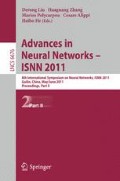Abstract
This paper discusses two models of the anti-stable vibration system. The anti-stable vibration system can be expressed the integer wave model and the fractional wave model. Many of engineering physical phenomenons can be modeled more accurately and authentically using the fractional order differential equations. The fractional wave equation is obtained from the standard integer wave equation by replacing the first-order time derivative with a fractional derivative of order b. The boundary controller of the two models of string vibration systems will be considered. This paper presents a boundary control method of the anti-stable fractional-order vibration systems. Numerical simulations are used to illustrate the improvements of the proposed control method for the fractional vibration systems.
Access this chapter
Tax calculation will be finalised at checkout
Purchases are for personal use only
Preview
Unable to display preview. Download preview PDF.
References
Chen, G.: Energy decay estimates and exact boundary value controllability for the wave equation in a bounded domain. J. Math. Pure Appl. 58, 249–273 (1979)
Komornik, V., Zuazua, E.: A direct method for the boundary stabilization of the wave equation. J. Math. Pure Appl. 69, 33–54 (1990)
Krstic, M., Guo, B.-J., Balogh, A., Smyshlyaev, A.: Outputfeedback stabilization of an unstable wave equation. Automatica 44, 63–74 (2008)
Liang, J., Chen, Y., Guo, B.-Z.: A hybrid symbolic-numeric simulation method for some typical boundary control problems. In: Proceedings of the IEEE American Control Conference, Boston, USA (2004)
Smyshlyaev, A., Krstic, M.: Backstepping observers for a class of parabolic PDEs. Systems and Control Letters 54, 613–625 (2005)
Smyshlyaev, A., Krstic, M.: Closed form boundary state feedbacks for a class of 1-D partial integro-differential equations. IEEE Trans. on Automatic Control 49(12), 2185–2202 (2004)
Liang, J., Chen, Y.Q., Fullmer, R.: Simulation studies on the boundary stabilization and disturbance rejection for fractional di®usion-wave equation. In: 2004 IEEE American Control Conference (2003)
Author information
Authors and Affiliations
Editor information
Editors and Affiliations
Rights and permissions
Copyright information
© 2011 Springer-Verlag Berlin Heidelberg
About this paper
Cite this paper
Zhang, Y., Wang, X., Wang, Y. (2011). Boundary Controller of the Anti-stable Fractional-Order Vibration Systems. In: Liu, D., Zhang, H., Polycarpou, M., Alippi, C., He, H. (eds) Advances in Neural Networks – ISNN 2011. ISNN 2011. Lecture Notes in Computer Science, vol 6676. Springer, Berlin, Heidelberg. https://doi.org/10.1007/978-3-642-21090-7_21
Download citation
DOI: https://doi.org/10.1007/978-3-642-21090-7_21
Publisher Name: Springer, Berlin, Heidelberg
Print ISBN: 978-3-642-21089-1
Online ISBN: 978-3-642-21090-7
eBook Packages: Computer ScienceComputer Science (R0)

